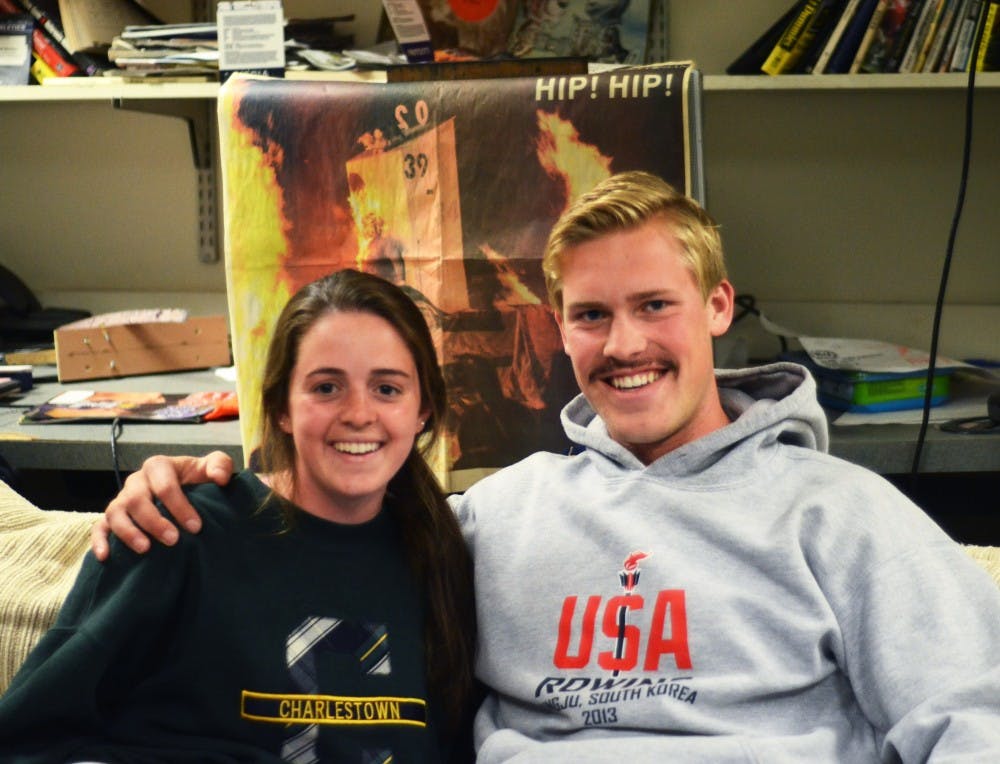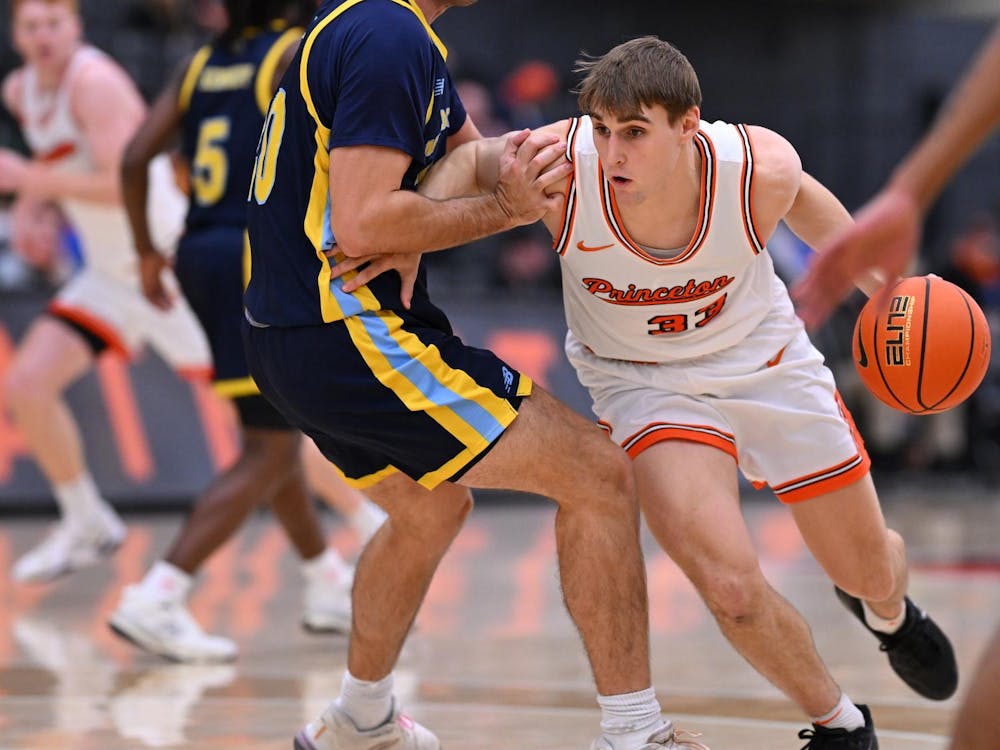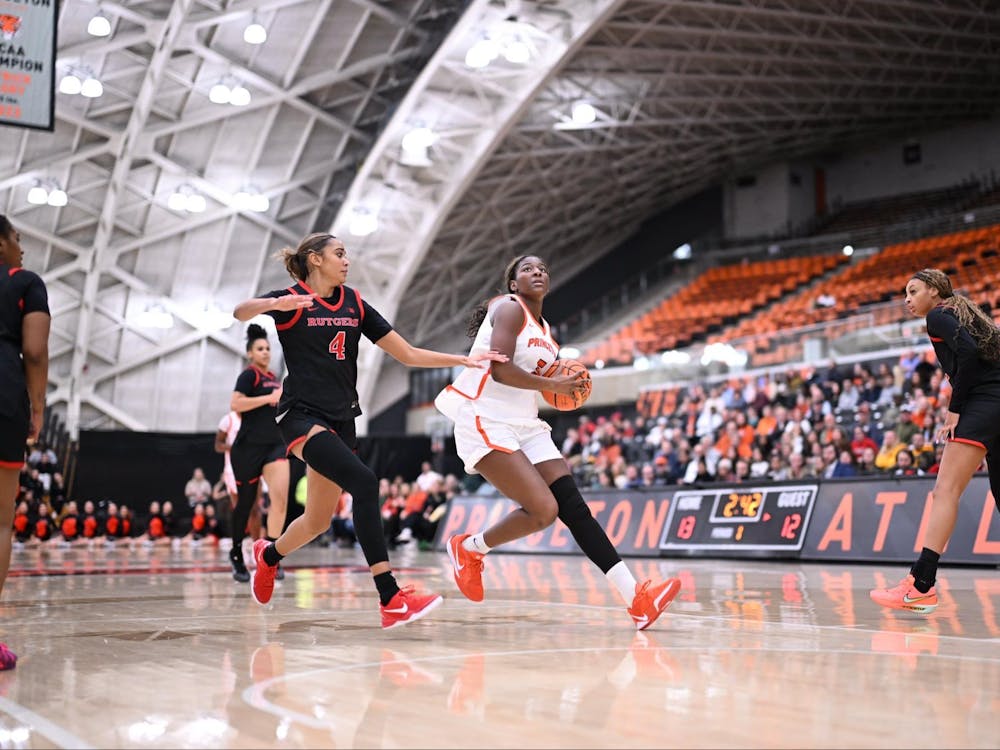There’s a certain sacred relationship between a crew and its coxswain. To get some insight into this dynamic, we sat down with heavyweight sophomores Martin Barakso and Jill Barton. They gave their thoughts on clothing-related traditions and, as always, their spices of choice.
Daily Princetonian: Where are you from and what’s it like there?
Jill Barton: I’m from Malvern, Pa. which is like an hour outside of Philadelphia. It’s pretty much the same as Princeton – not too much different. I guess it’s a little rustic.
Martin Barakso: I’m from Nanaimo, British Columbia, Canada. Really small town on the ocean, on the west coast. It’s just very small; nothing ever happens there. Very picturesque and nature-y, but nothing ever goes on there.
DP: What’s the best part about being from your respective hometowns?
JB: I guess since it’s a smaller town there’s a sense of community, so we have festivals, there’s a Ms. Malvern pageant, and we have a Malvern song, which is a little quirky but I think it’s cool.
MB: Probably just being able to go back twice a year and have the nature there that you don’t have on the East Coast. Being able to go fish and go kayaking in the ocean. And having the ocean right there.
DP: In a previous interview, heavyweight rowers George Bradbury and Fred Vystavel mentioned a tradition of snagging the opposing crews’ jerseys after a race if you beat them. Could you talk a little about that?
MB: It’s been around for over a hundred years, definitely since the 1800s. Every time a team’s lost they give you their shirt. And you used to race with the shirt on your back, so after a race they’d just pull up and literally pull the shirt right off your back. Now with unisuits you just row to the dock and give them your shirt. It’s definitely the only sport that does that. Women’s rowing doesn’t even do it — just men’s rowing. And it’s a really cool tradition.
JB: It’s also a motivating factor, like you never want to give your shirt up. There’s a little bit of a humiliation factor when you have to give up the shirt off your back.
DP:Jill, could you talk just in general terms about the role of the coxswain and what you do on/off the boat?
JB: I guess the coxswain’s main responsibility is just directing practice and directing the eight guys in the boat. When you’re actually in a boat there’s a lot going on. You have the coach telling you what to do; you’ll have other boats next to you; you’ll have conditions on the racecourse. And a lot of it is just translating that to the guys. Give them something to act upon. At the same time you have to steer the boat and make sure it goes straight and doesn’t hit anything.DP: Could you guys give us any sort of pre-race superstitions either yourselves or people on the team have?
JB: A lot of people, before they race, will go over everything in their seats and check to make sure everything is literally as tight as possible so nothing pops out.
MB: Before every single race, starting with the stroke guy, you pass a fist bump down the entire boat. But before we even get on the water, no one really does anything. We meet at seven, walk down, the coach talks to us, then you warm up and go on the water — it’s very straightforward.
DP: What do you enjoy most about being on heavyweight crew?
MB: Obviously the people. I think we’re one of the closest teams, especially the sophomore class. We hang out, we eat every single meal together the entire year, hang out every weekend, are together for so many hours a day. Also just the history and being able to know what’s happened before you so you can try to create your own history I guess.
JB: I second the people. Also I just think there’s something beneficial about being able to segment off two hours of your day for something that isn’t school or work. You can just do something else for a bit.
DP:Least favorite part of being on crew?
MB: Just whenever it rains or snows. Especially over spring break training when we have to stay here and row twice a day. If it’s hailing or 30 degrees out and you can’t feel your hands, that’s the worst.
JB: I’d say the same. Also having to keep up a positive attitude when it’s literally hailing and there are 20 mile-per-hour winds.
MB: Yeah, at least we get to move. Jill just has to sit there for two hours.
DP: Do you guys have any embarrassing crew-related memories?
JB: Well I rowed for two years before becoming a coxswain, so I guess anything in those two years you could call embarrassing.MB: Just looking back at when you started rowing and realizing how terrible you were and how much time you’ve had to put in. Yeah, just thinking how bad you started off.I mean you literally just have no clue how to row. I flipped over the first time I got in a boat, since you just have no idea how to do anything. And it’s not like other sports where you can pick up a ball or something. You’ll just flip right into the water if you don’t know how to do it.
DP: What have been the proudest moments of your rowing career?
JB: I remember a race in the fall, and I was in the 2V, or people’s varsity boat. I just had probably the best race of my life. There was just a lot of pressure throughout the race – like there was another boat right next to us the whole time – and they were pressuring us the whole time. It was just a very stressful situation, and we just made the decision about two thirds of the way into the race to leave them in our dust, and we did it. It was pretty cool.
MB: I think Fred mentioned it in his interview – the 2V race at the end of the year when there were four boats within a second. It was pretty cool to be a part of that and have everybody be so close in such intense competition.
DP: If you could pick up a varsity sport other than rowing what would it be?
MB: I would definitely want to be a basketball player since I played basketball in high school, but I was terrible and uncoordinated. It would be really fun to actually be good.
JB: I guess probably soccer for me. I think it would be really fun to run around and kick a ball. And I guess this isn’t a sport, but I’d like to be able to dance. I think being a dancer would be very cool and useful.
DP: Who is the quirkiest kid on your team?
MB: Too easy – it’s PK [sophomore Patrick Konttinen]. I have thousands of stories, depending on what you want to put in the paper.
JB: I actually think [junior] Jamie Hamp’s the quirkiest guy.
MB: PK is just the funniest. We talked about PK in the last one, so let’s rip on Jamie.
JB: He has a really funny way of wearing his uni tank combination where he rolls his uni up so it’s shorter than his actual tank.
MB: He trains every single day of the year at 6 a.m. by himself. He wakes up at six every morning. He’s also in my boat, and he talks the entire practice. Nobody else in the boat will be talking, but he’ll say something every five minutes and the whole boat is like, “Why did you just say that? That makes no sense.” He has no filter.
JB: But he insists on the fact that he filters about 95 percent of the things that he says, which is really frightening if you’ve ever had a conversation with him.
MB: I wonder what actually goes on in his head.
JB: I’m frightened to think.
DP: Jill, could you talk about being the only female on a boat of males who are roughly twice your size?
JB: It was pretty intimidating at first, I was afraid to say anything. But I’m not really that afraid of them anymore; I feel like I’ve settled into a pattern. Occasionally someone will say something or do something really weird, but other than that it’s pretty normal.
DP:Martin, what’s it like having some ladies on the crew?
MB: I really like it, it’s a good change. Especially with Jill as your cox, sometimes she’ll get really excited and her voice will get really high. It’s nice to have a high pitched voice screaming at you – it motivates you more. It’s a nice change.
DP: There are a couple appearance-related traditions on your team such as the jean shorts. Could you talk a little about the meaning of that to the team?
MB: I guess it’s been going on for the last 10 years or so, and it’s a great way, too, because we’re dry, every day we cut our jean shorts, and then on Sunday we get together and take a lot of pictures. It makes it more enjoyable for being dry. But it’s just fun to do; we get the most outrageous pants possible. I got bright gold pants.
DP: Martin, you got a full-page ad in Nassau Weekly a couple weeks back – here’s a chance at some free publicity. Why should I pick Princeton iPhone Repair over Tiger iPhone Services?
MB: I’ve recently cut my prices to be cheaper than [junior John] Plonk’s. I fix iPads and computers and Samsungs and iPhones, so I service a wide range of products. We have 90-day warranty. We have a lovely shop up on Nassau Street with people always there to help you whenever you need it.
JB: I’ve gotten my own iPhone fixed by Princeton iPhone Repair, and there is impeccable customer service.
MB: We try to give the best possible customer experience. We go all out for our customers.
DP:Have you found that iPhone 5 chargers periodically stop working?
MB: Yeah, they’re really bad. We sell them for $3 in our shops.
DP: I’ll look into that. One more question for you Martin: according to your bio, you had a very outstanding high school career, including a big performance at the Head of the Charles. What more were you looking to accomplish in your collegiate career?
MB: In high school, you have only one or two good rowers in each school. Being able to be with other amazing rowers and being able to accomplish something together with them is what I’ve been most excited about. Winning sprints with the eight guys you spend so much time with is definitely the ultimate goal. And it’s great to be around 40 guys who are good every day, rather than just one or two.
DP: Which one you is the better person?
MB: Jill. Definitely Jill.
JB: Yes.
DP: If you were to be a spice, would you be salt, pepper or oregano, and why?
JB: I’d say oregano just because no one ever says oregano.
MB: I’d also say oregano. Especially when you’re eating Italian, sometimes you want that flavor in it. Salt and pepper are too boring.







